

What Is a Cost Estimating Database? Complete Construction Guide
TL;DR: A cost estimating database is a centralized digital library for all your historical cost data, construction cost information, pricing details, and estimation tools. With a construction cost database at your fingertips, you can build more accurate estimates, submit faster bids, exercise better cost control, and steer construction projects away from budget surprises.
What Is a Cost Estimating Database?
Imagine you’re racing to provide a construction cost estimate, but half your cost data is buried in old spreadsheets, some in files, and the rest in someone’s head. No wonder mistakes slip through. Missing or outdated data can lead to poor cost control and put your construction projects at risk of overruns or lost bids.
When project costs are scattered, your team is exposed to risks like inaccurate estimates, time-consuming manual data entry, and costly errors. In today's construction industry, construction professionals need cloud based access to up to date cost data to make informed project decisions. That’s where a construction cost estimating database steps in. Software like CostOS brings all your estimating data, including historical cost records, material and labor costs, equipment costs, and more, into a single source of truth. This improves tracking and management of project costs and minimizes risk.
If you’re tired of piecing together costs from different sources, it's time to see how a cost estimating database anchors your project budgets, maintains cost control, and supports accurate cost estimation and planning.
Definition and Core Functionality
A construction cost estimating database is a comprehensive repository of cost information related to materials, labor, equipment, and other expenses associated with construction projects. It works much like a digital library built for cost data, integrating smoothly with cost estimating software and project management systems to provide up to date estimates and support for the entire project lifecycle.
The key advantage is that every piece of cost data is organized. Both historical and current construction costs are sorted, labeled, and instantly accessible. Beck Technology notes these construction cost databases take the guesswork out of estimates, placing reliable cost data right where construction professionals need it. This allows more informed bidding, stronger control over estimates, and greater project success.
Why Use a Construction Cost Database?
- Keeps cost-related decisions rooted in data to minimize risk
- Enables benchmarking with historical cost data for trend analysis
- Enhances resource allocation and scheduling by tracking labor prices, material availability, and equipment costs
- Improves cost control through early identification of budget variances and cost overruns
- Supports data accuracy and transparency in planning and project management
- Facilitates collaboration by providing cloud based access across teams
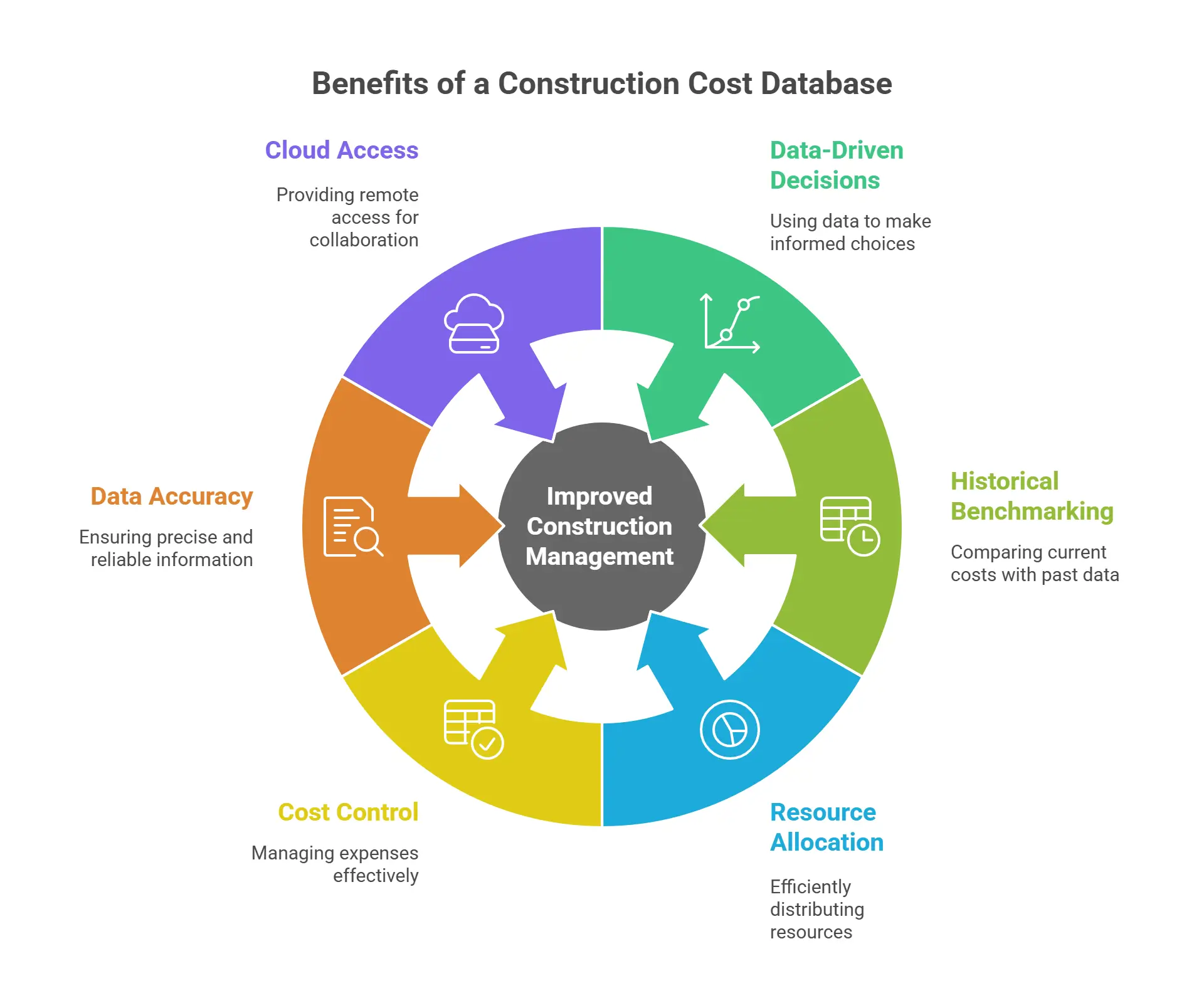
Key Components of a Construction Cost Estimating Database
A top-notch construction cost database integrates several key features that deliver efficient, accurate, and transparent estimates for projects of any size.
Historical Data and Cost Data Classification
The backbone of any construction cost database is its collection of historical cost data. These data repositories combine completed project records, in house figures, and external industry benchmarks. Zebel blends both internal data and market information to keep estimates accurate and relevant.
Databases are usually organized by:
- Project type, classification, and building types
- Location, region, or market
- Date, ensuring data is up to date and reflects market
- Construction materials, labor types, and equipment costs
This smart classification allows estimators to find relevant line items and cost data quickly, aiding in robust benchmarking and cost trend analysis.
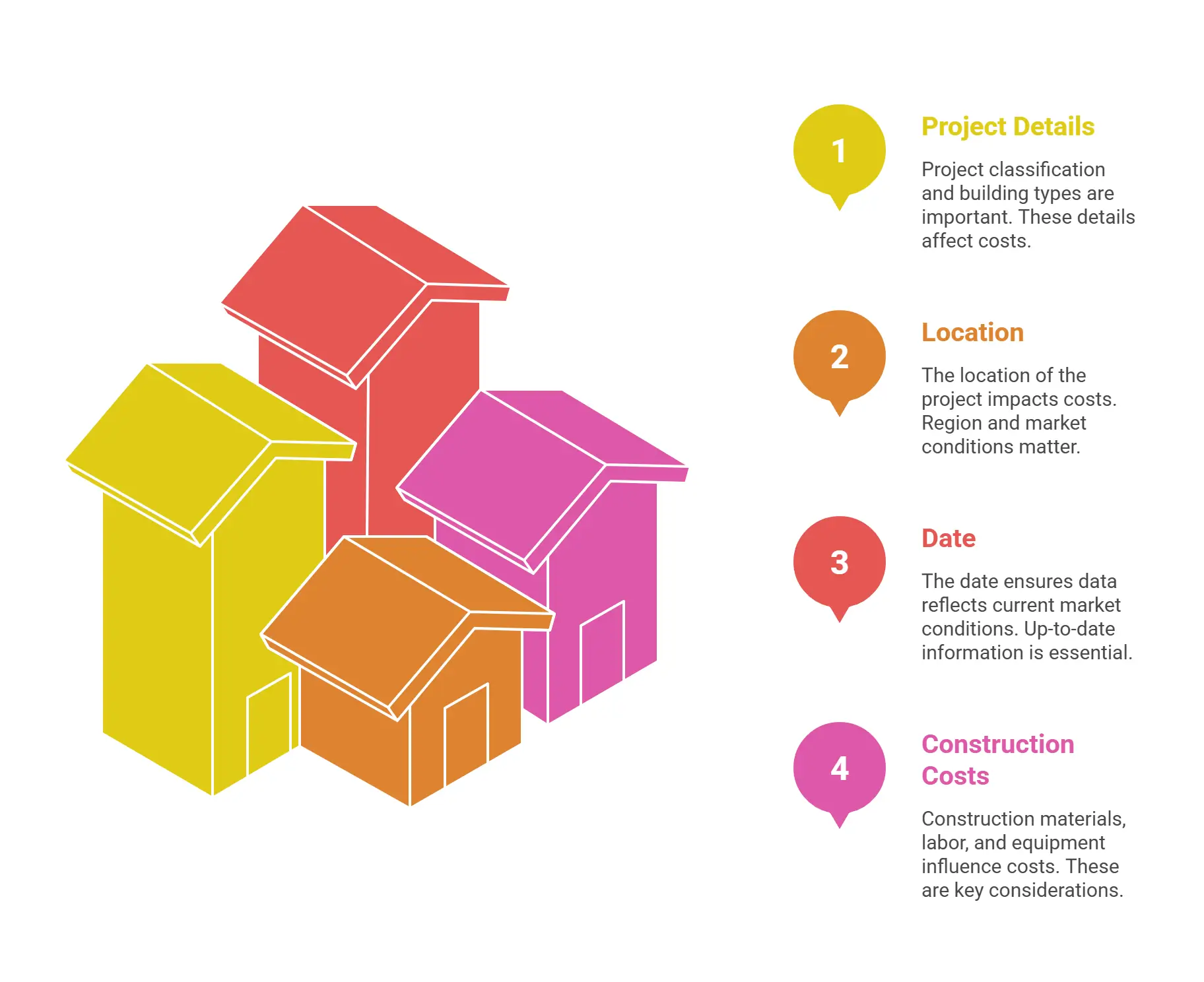
Assemblies, Cost Books, and Pre-Built Items
A construction cost estimating database often includes collections of pre-built assemblies and cost books, which bring together construction cost data for components typically used together. This approach is common in platforms like Nomitech’s InfraBase and RSMeans Data Online.
Assemblies bundle line items like labor, materials, and equipment costs, making conceptual estimates more accurate and supporting cost control from early design through final planning. Pre-built cost books and items help estimators create comprehensive budgets, cut time spent on manual data entry, and support all various stages of the estimating process. Automatic quarterly updates and cloud based access keep this data up to date and connected across teams.
Integrated Estimation Tools and Analytics
The best construction cost databases come with advanced estimating tools for searching, analyzing, and reporting. Integration with construction estimating software enables estimators to:
- Run analyses using current market conditions and actual costs
- Generate accurate estimates quickly
- Track costs and spot trends over project schedules
- Benchmark against past projects
- Facilitate real-time collaboration and cost control
Having a centralized, cloud based construction cost database ensures all data is up to date and secure, providing transparency and single source reliability for your team.
Why Accurate Cost Estimation Matters for Project Success
Accurate cost estimation is essential for the success of any construction project. Reliable cost data reduces the risk of cost overruns, underestimated expenses, and costly change orders.
Benefits of Accurate Estimates in Cost Control
- Minimizes unexpected costs and ensures projects stay within budget
- Supports efficient allocation of labor, material, and resources
- Enables construction professionals to create competitive and confident bids
- Provides transparency for clients and stakeholders
- Helps general contractors deliver projects on schedule and on budget
Regularly updating cost information and performing audits ensures data accuracy. Benchmarking against historical cost data and using advanced analytical features directly supports precise and informed project planning.
How Construction Cost Databases Improve Project Outcomes
- Enables quick conceptual estimates for preconstruction teams
- Supports real-time collaboration with internal and external stakeholders
- Helps define best practices by analyzing project metrics
- Enhances transparency and efficiency in cost management
- Provides insights into labor and construction materials availability and costs
Typical Structure and Features of Construction Cost Databases
Understanding how a construction cost database is structured helps construction professionals unlock its full benefits.
Key Features in Construction Cost Databases
- Centralized, cloud based access: All users work from the same reliable cost data
- Up to date rates: Automatic quarterly updates reflect market changes and trends
- Cost books and assemblies: Pre-built line items save time and improve accuracy in estimates
- Detailed historical data: Enables tracking actual costs against estimates for variance analysis
- Secure data management: Protects information integrity and supports data security
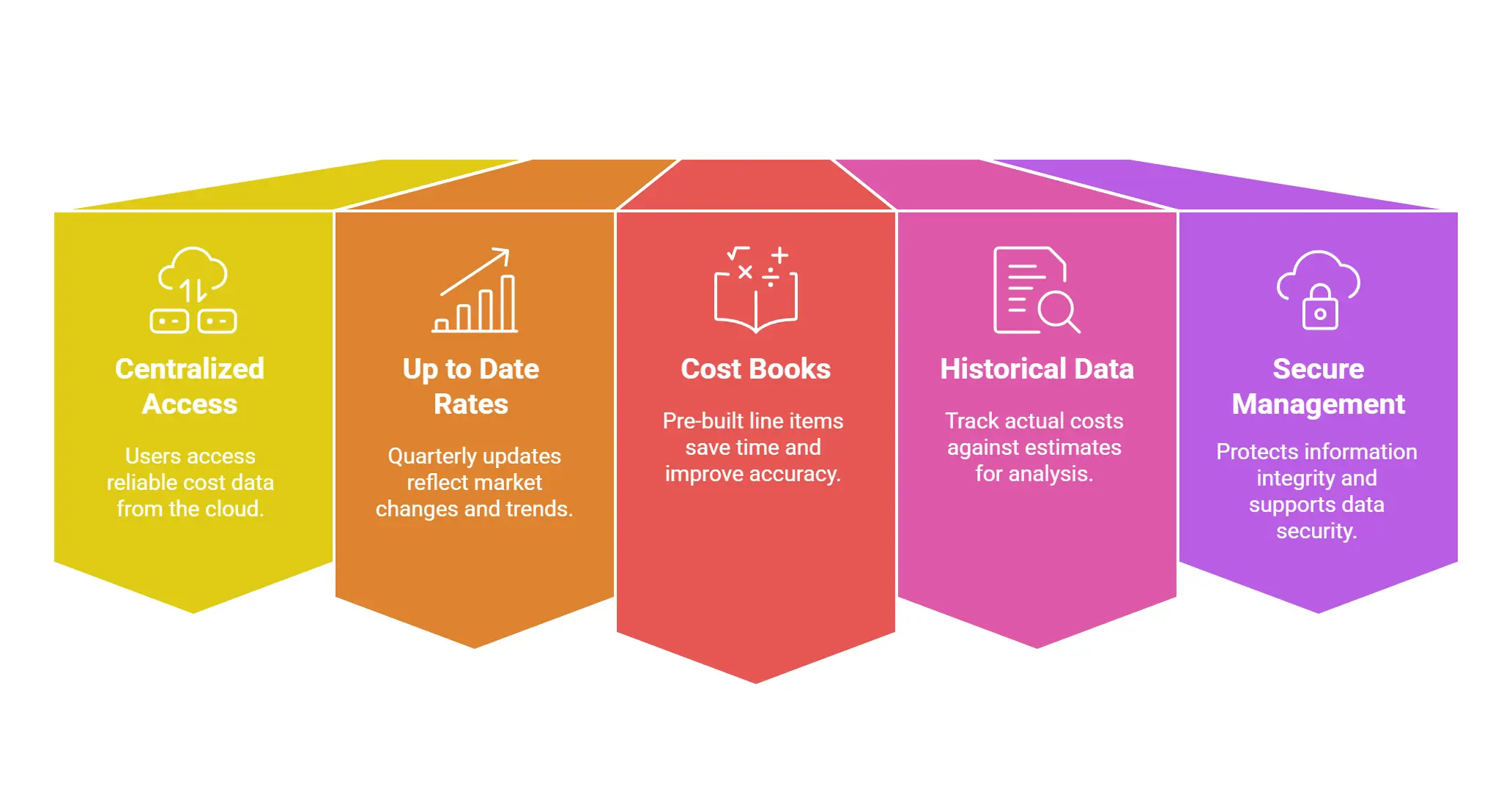
Advanced Estimating Tools
Modern cost databases feature advanced estimating tools that integrate with software and project management platforms. These tools allow teams to enhance accuracy, transfer data seamlessly, and avoid time consuming manual entry. Real-time updates and flexible reporting make it easy to assess various scenarios, evaluate different building types, and spot cost trends.
Industry-Standard Construction Cost Databases
On complex or high-budget projects, gaining access to the right construction cost database can transform cost estimation. Certain platforms have become industry standards.
RSMeans Data Online: The “Gold Standard” for Construction Cost Data
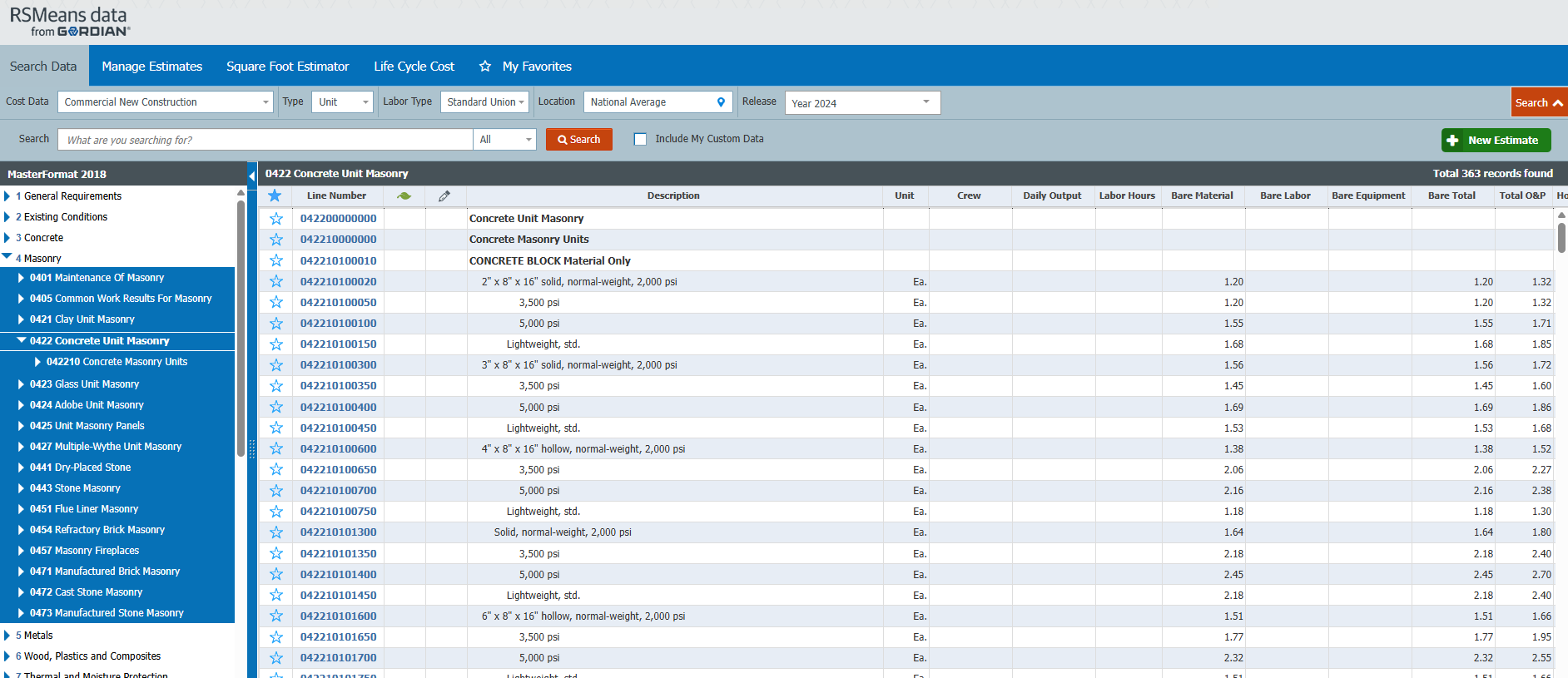
RSMeans Data Online is widely recognized for providing over 20,000 detailed unit prices spanning all CSI MasterFormat divisions. Many general contractors and project teams rely on RSMeans Data Online for:
- Accurate construction cost data for every trade
- Comprehensive cost books updated quarterly
- Reliable cost data for conceptual estimates and detailed bids
- Labor prices, material costs, and equipment rates
- Cloud based access to ensure teams are always working with up to date data
Industry experts see RSMeans Data Online as an essential foundation for efficient project planning, competitive bids, and risk management.
Free and Affordable Construction Cost Databases
Not every team can justify comprehensive paid tools. Alternatives like PriMus give smaller construction professionals or preconstruction teams a way to access structured, credible cost data for free. These resources facilitate competitive bidding, benchmarking, and informed decision-making without upfront expenses.
Construction Cost Database Use Cases: From Planning to Execution
It’s not just large construction projects that benefit. Construction cost databases play a crucial role for all stakeholders, from engineers and owners to designers and contractors, supporting every stage from conceptual estimates through closeout.
Preconstruction and Conceptual Estimates
Accurate conceptual estimates in the early phase can make or break a project. Construction cost databases enable:
- Fast generation of conceptual estimates based on up to date cost data
- Evaluation of different scenarios using reliable cost information
- Reduction of time consuming manual entry and guesswork
Project Planning, Benchmarking, and Forecasting
A historical construction cost database allows planners to:
- Benchmark current estimates against historical project costs
- Track market changes, cost trends, and labor rates
- Provide up to date information for financial forecasting and planning
- Identify variances between estimates and actual costs, supporting cost control
Cost Control and Project Management
Strong cost control depends on having a cost database that is accurate and current. Construction professionals use databases to:
- Track actual costs against budgets in real time
- Allocate resources like labor and materials more efficiently
- Monitor project schedules and adjust estimates quickly
- Enhance data accuracy, ensuring informed project decisions and successful outcomes
Best Practices for Selecting and Maintaining a Construction Cost Database
Choosing and maintaining an effective construction cost database is critical for project success.
Essential Selection Criteria
- Historical cost data quality: Accurate, up to date records form reliable cost data for strong estimates
- Project classification: Clear categories streamline cost comparisons for different building types and locations
- Detailed breakdowns: Fine-tuned cost books and assemblies support precise budgeting
- Cloud based access: Centralizes data and supports real-time collaboration across teams
- Integrated tools: Searching, reporting, and analytics should fit seamlessly into your estimating process
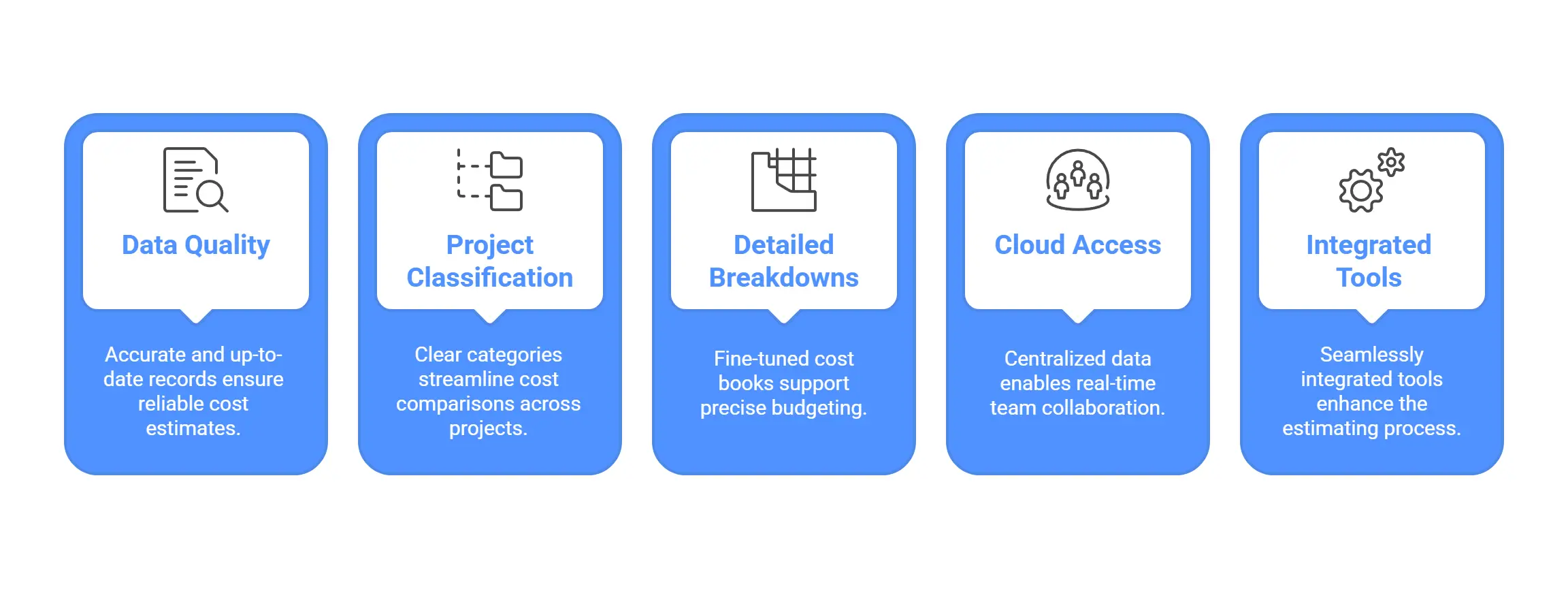
Focus on matching your database’s key features to your construction projects and team needs rather than chasing generic options.
Maintaining Data Accuracy & Security
- Regularly update cost data to keep pace with market changes
- Conduct audits for data accuracy and relevance
- Monitor actual costs versus estimates for cost control and early detection of overruns
- Ensure robust data security measures for sensitive project and client information
Training & Onboarding for Effective Use of Cost Databases
The value of a construction cost database depends on how well your team can use it. Structured training and onboarding for new estimators is key:
- Standardized databases let new estimators quickly learn the estimating process
- Ongoing training sessions highlight key features and reinforce best practices
- Periodic reviews and mentorship from experienced estimators boost practical skill development
- Collaboration and real-time communication are strengthened through cloud based platforms
Effective onboarding ensures teams get the most out of cost data, ultimately leading to better estimates and project outcomes.
The Future of Construction Cost Databases
Modern construction is moving rapidly to digital, cloud based, and connected estimating environments. The construction cost database is no longer just a digital binder. It's the backbone that drives smart, fast, and transparent project delivery.
Integration With Advanced Estimating Tools
Future-ready construction cost databases connect directly with advanced estimating tools and project management software. Current platforms deliver:
- Real-time API connections, automatic quarterly updates, and syncing across teams
- Flexible data views for various stages and project types
- Centralized, up to date cost information for all construction professionals
By integrating seamlessly, these databases provide reliable cost data, reduce time consuming manual updates, and eliminate version chaos. Expect construction cost databases to become the single source for cost data across every phase, from estimate to final accounting.
Frequently Asked Questions
What is a cost estimating database and why is it important?
A construction cost estimating database creates a centralized digital home for all your estimation data, including historical cost data, current prices, labor rates, equipment costs, and more. It ensures data accuracy, allows for benchmarking, and supports accurate cost estimation at all project stages.
What data does a good construction cost database include?
A reliable construction cost database covers historical cost records, cost books, detailed breakdowns, parametric models for conceptual estimates, and advanced estimating tools. All of this is supported by up to date data reflecting market conditions.
How does a cost estimating database benefit project planning and bidding?
Construction cost databases allow teams to turn out accurate estimates and competitive bids using credible, up to date cost information. They increase efficiency, benchmarking, and data-driven project decisions.
What should I look for when choosing a construction cost database?
Look for high-quality historical cost data, clear classification, robust assemblies and breakdowns, up to date prices, cloud based access, and integration with the software you use for construction estimating and project management.
Ready to Take the Next Step?
Ready to enhance your construction estimating process, maintain better cost control, and create more accurate cost data for your projects? Explore Nomitech’s full suite of estimating solutions or reach out to discuss how a construction cost database can help deliver reliable, up to date estimates for your next project.




